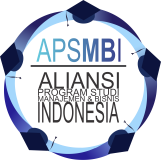Pengaruh praktik total quality management dan knowledge management terhadap kinerja perguruan tinggi
Abstract
This study aims to analyze the impact of total quality management practice on higher education performance is mediated by knowledge management of universities in Padang City. This type of the research is a descriptive causative approach. This research was carried out in study program at universitie in Padang City. The populations in this study were all study programs throught universities, both state universities, private universities, religion universities, and university with many faculties in the city of Padang. The sample used is 80 study programs at university collages with Probability sampling technique with the sampling method is using stratified proportionate random sampling. The type of the data in this study are primary and secondary data. Data were collected through questionnaires, analyzed using the SPPS version 22 and path analysis.
Keywords
Full Text:
PDFReferences
Abadi, S., Sari, K. P., & Widiyarto, S. (2018). Model pengukuran kinerja perguruan tinggi swasta di kabupaten Pringsewu menggunakan metode balance scorecard dan fuzzy multiple attribute decision making. Dcc, 1–6.
Al-Salim, A. A. A. (2018). Total quality management its impact on the performance of educational institutions. International journal of scientific and research publications (IJSRP), 8(8), 239–247. https://doi.org/10.29322/ijsrp.8.8.2018.p8029
Al Ahmar, G. O., Rofiq, A., & Zain Hadiwodjojo, D. (2014). The impact of knowledge management, learning organization, and educations organization on organization performance: A case in Brawijaya University. Asia pacific management and business application, 3(1), 28–47. https://doi.org/10.21776/ub.apmba.2014.003.01.3
Alavi, M. (2001). Knowledge management and knowledge management system: conceptual foundations and research issues. MIS Quarter, 25(1), 35-3107–1367.
Alshatnawi, H. A. M., & Ghani, M. B. A. (2018). The effect of total quality management and knowledge management on organizational performance in higher education institution in Jordan. International journal of academic research in economics and management sciences, 7(3), 17–29. https://doi.org/10.6007/IJAREMS/v7-i3/4286
Amir, F. (2016). Manajemen kinerja perguruan tinggi. Mitra Wancana Media.
Ardi, R., Hidayatno, A., & Zagloel, T. Y. M. (2012). Investigating relationships among quality dimensions in higher education. Quality assurance in education, 20(4), 408–428. https://doi.org/10.1108/09684881211264028
Armstrong, S. (2014). Handbook of human resource management practice (13th ed.).
Chen, S., Wang, H., & Yang, K. jang. (2009). Establishment and application of performance measure indicators for universities. The TQM journal. https://doi.org/10.1108/17542730910953004
Davenport, T. H. (1998). Working knowledge: how organizations manage what they know. Choice reviews online, 35(09), 35-5167-35–5167. https://doi.org/10.5860/choice.35-5167
Dean, J. W. (1994). Management theory and total quality: improving research and practice.19(3), 392–418.
Djokopranoto, R., & Indrajit, R. E. (2014). Manajemen perguruan tinggi moderen. 1–389. https://s3.amazonaws.com/academia.edu.documents/38229897/Book15-ManajemenPTModeren.pdf?AWSAccessKeyId=AKIAIWOWYYGZ2Y53UL3A&Expires=1538532972&Signature=dM9o0P1wUTPoeDYIyAmKCcat7Ts%3D&response-content-disposition=inline%3B filename%3DManajemen_Perguruan_Ti
Flynn, B. B., & Flynn, B. B. (2006). The relationship between quality management practices, infrastructure and fast product innovation. Benchmarking for Quality Management & Technology, Vol. 1 Iss 1 pp. 48 - 64
Heizer, J., Render, B., & Munson, C. (2017). Operations management (ed. Twelfth). Pearson.
Henri Tapio Inkinen, Aino Kianto, Mika Vanhala, P. R. (2015). Knowledge management practices and innovation performance in Finland. Baltic journal of management, Vol. 10 Iss 4 pp. 432 –455.
Hung, R. Y.-Y., & Lien, B. Y.-H. (2004). Total quality management practices and their effects on organizational performance. Online submission, 1188–1194.
Jane, O. (2009). Peran knowledge management dalam meningkatkan kinerja perguruan tinggi. Jurnal administrasi bisnis. Vol. 5, No. 1, 30–43.
King, william R. (2009). Knowledge management and organizational learning. https://doi.org/10.1007/978-1-4419-0011-1
Kruger, C. J. N., & Johnson, R. D. (2011). Is there a correlation between knowledge management maturity and organizational performance? In Vine (Vol. 41, Issue 3). https://doi.org/10.1108/03055721111171618
Laal, M. (2011). Knowledge management in higher education. Procedia computer science, 3, 544–549. https://doi.org/10.1016/j.procs.2010.12.090
Munizu, M. (2010). Pengaruh penerapan praktik total quality management (TQM) terhadap kinerja kualitas (studi persepsi karyawan pada PT. Sermani Steel Makassar). Iqtishoduna. Vol 7, No. 1
Dhamdhere, S. (2015). Importance of knowledge management in the higher educational institutes. Turkish Online Journal of Distance Education, 16 (1), 162–183.
Nasution, M. . (2006). Manajemen Mutu Terpadu (Total Quality Management). Ghalia Indonesia.
Nur Indrianto & Bambang Supomo. (2016). Metodologi Penelitian Bisnis Untuk Akuntansi & Manajemen. BFE-Yogyakarta.
Oakland, J. S. (2014). Total Quality Management And Operational Excellence (Fourth). Routledge.
Ooi, K., Teh, P., & Chong, A. Y. (2009). Developing an integrated model of TQM and HRM on KM activities. 32(5), 477–490. https://doi.org/10.1108/01409170910952976
Psomas, E., & Antony, J. (2017). Total quality management elements and results in higher education institutions: The Greek case. Quality Assurance in Education, 25(2), 206–223. https://doi.org/10.1108/QAE-08-2015-0033
Qasrawi, B. T., Almahamid, S. M., & Qasrawi, S. T. (2017). The impact of TQM practices and KM processes on organisational performance: An empirical investigation. International Journal of Quality and Reliability Management, 34(7), 1034–1055. https://doi.org/10.1108/IJQRM-11-2015-0160
Ramanauskienė, J., & Ramanauskas, J. (2006). Application of the principles of total quality management in the knowledge formation. Visuotinės kokybės vadybos principų taikymas žinių formavimo procese., 46 (1), 62–68.
http://ezproxy.umgc.edu/login?url=https://search.ebscohost.com/login.aspx?direct=true&db=bth&AN=20837875&site=eds-live&scope=site
Supardi. (2012). Arah pendidikan di Indonesia dalam tataran kebijakan dan implementasi. Formatif: Jurnal ilmiah pendidikan MIPA, 2 (2), 111–121.
Yaakub, M. H. (2020). Measuring the performance of private higher education institutions in Malaysia. 12(3), 425–443. https://doi.org/10.1108/JARHE-10-2018-0208
Zack, M., McKeen, J., & Singh, S. (2009). Knowledge management and organizational performance: An exploratory analysis. Journal of Knowledge Management, 13 (6), 392–409. https://doi.org/10.1108/13673270910997088
Zaidah, Y. (1996). Pengukuran kinerja fakultas teknik universitas Trunojoyo menggunakan academic scorecard (ASC) dengan metode analytical hierarchy process (AHP). Rekayasa, Vol. 3, No. 2
Zwain, A. A. A., Lim, K. T., & Othman, S. N. (2017). TQM and academic performance in Iraqi HEIs: Associations and mediating effect of KM. TQM Journal, 29(2), 357–368. https://doi.org/10.1108/TQM-08-2013-0096
DOI: http://dx.doi.org/10.24036/jkmw02112850



